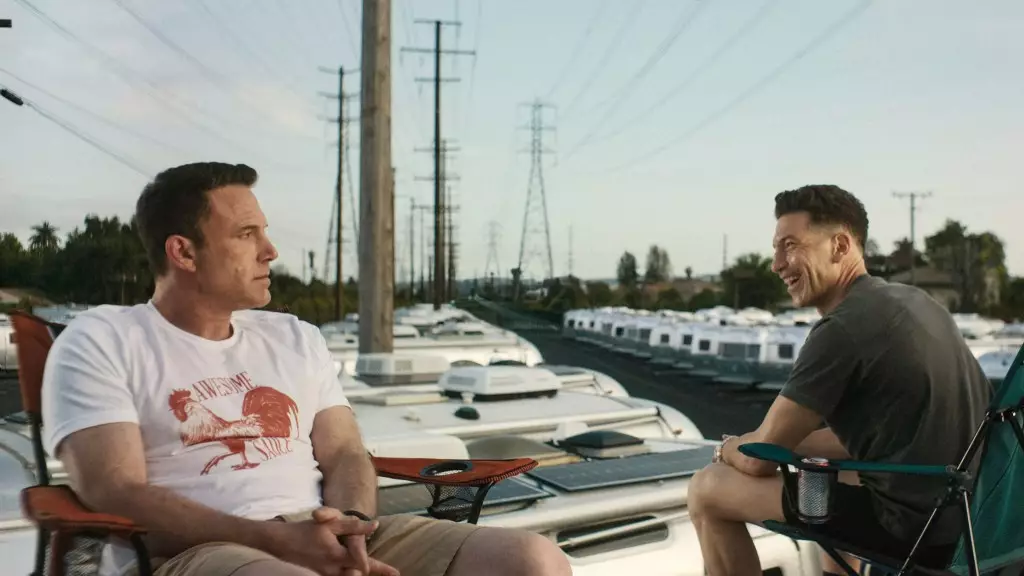As film continues to reflect societal perceptions, the evolving representation of individuals on the autism spectrum is a topic of both celebration and controversy. The recent announcement of *The Accountant 2*, with Ben Affleck reprising his role as Christian Wolff, has reignited a profound discussion about the portrayal of neurodiversity in Hollywood. Director Gavin O’Connor claims that this sequel aims to champion the neurodivergent community, yet I can’t help but question the sincerity and effectiveness of such efforts when the backdrop is riddled with ignorance, as seen in the rhetoric of figures like Robert F. Kennedy Jr.
Kennedy’s speculative comments stigmatizing autism as a “preventable disease” that “destroys families” reflect a widespread misunderstanding that persists even among educated circles. For a figure who is, ostensibly, a voice of reason, such sentiments sound alarm bells about how misinformation breeds misconceptions that directly impact real lives. O’Connor’s attempt to elevate the conversation surrounding autism through this film emerges as a double-edged sword when juxtaposed with these damaging narratives.
Connecting with Neurodiversity: The Good and The Bad
While O’Connor insists that the intent of *The Accountant 2* is to humanize the autism experience—or as he would describe it, “just about humanizing the character”—the choice of having a neurotypical actor at the helm raises thorny questions. Is it truly possible to authentically represent neurodiverse experiences through the lens of someone who doesn’t share those lived realities? While Affleck may have undergone research and preparation, can one ever fully capture an experience from an outside perspective without leaning into stereotypes, caricatures, or, worse, creating a punchline? Critics have already emerged, voicing discontent about whether the film’s narrative will resonate authentically with the neurodivergent community it claims to represent.
It’s worth noting that O’Connor claims to have surrounded himself with experts, even spending time in environments with neurodivergent individuals to gather insights. Yet, without lived experience as a guiding compass, there’s an inherent risk of misinterpretation. Forcing a narrative through the lens of neurotypical understanding can lead to oversimplified or exaggerated portrayals, feeding back into the cycle of misunderstanding and misrepresentation.
Representation and Authenticity: A Dilemma
The cast inclusivity in *The Accountant 2*, such as featuring neurodivergent actress Allison Robertson, is a praiseworthy step toward representation, but can it redeem the entirety of the film’s messaging? A single character or side-role doesn’t absolve the primary narrative from the potential pitfalls that arise when representation is unbalanced. Hollywood has a history of tokenism, and merely inserting neurodivergent actors doesn’t automatically translate into authentic representation. Without a substantial narrative focus on their perspectives and experiences within the context of the main storyline, will the film truly embody the voices of the individuals it seeks to represent?
The film industry must grapple with the responsibility of not just telling stories but also amplifying authentic voices from within the communities it seeks to depict. Audiences are becoming progressively more aware and critical of the narratives portrayed on screen. Lauded for their artistic storytelling flair, filmmakers must adapt to ensure that their contributions to the portrayal of neurodiversity avoid perpetuating harmful stereotypes or misrepresentations.
The Cultural Conversations that Must Follow
In the chaotic swirl of media narratives, it’s essential to reflect on the broader implications of how we represent marginalized voices. The way we discuss neurodiversity in films can significantly shape public perception and societal attitudes. Rather than simply serving as entertainment or source material for action-packed plots, these films possess the power to educate and inspire understanding. However, the responsibility lies not only with filmmakers but with society at large to demand nuanced portrayals and to critically engage with the narratives being offered.
O’Connor’s commitment to creating more than a surface-level portrayal is commendable; however, it remains to be seen whether *The Accountant 2* can break the barriers of tokenism and inadequate representation. Advocating for neurodiverse storytelling requires a radical shift in who is writing, directing, and producing these narratives, prioritizing voices that have been historically sidelined. This seismic transformation is not just necessary but vital for fostering an accurate understanding of neurodiversity in our cultural conversation.

Leave a Reply